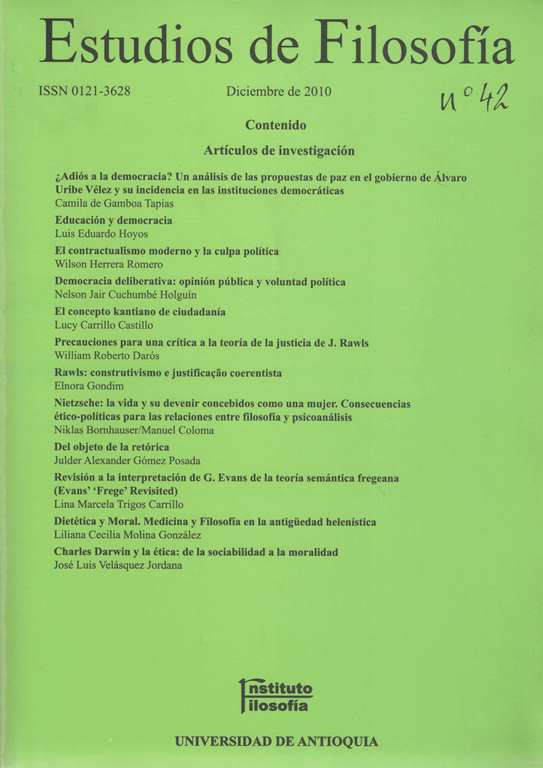Rawls: constructivism and coherentist justification
DOI:
https://doi.org/10.17533/udea.ef.11586Keywords:
Rawls, justification, coherentist, original position, reflective equilibrium, doctrinesAbstract
Rawls has a Coherentist justification for justice as equity when he states that the Procedural Constructivism can be used to identify the Principles of the Justice of Citizens with various comprehensive morals doctrines making use of the Original Position, of Reflective Equilibrium and of a Public Reason.
Downloads
References
FLORES, I. (1985). El liberalismo igualitario de John Rawls. Doxa, 4
FREEMAN, S. (2003). John Rawls. En S. Freeman (Ed.), The Cambridge Companion to John Rawls. Cambridge: Cambridge University Press. DOI: https://doi.org/10.1017/CCOL0521651670
GRAY, J. (1993). Can We Agree to Disagree. The New York Times Books Review (16).
GUILLARME, B. (1999). Rawls et l'égalité démocratique. Paris: Presses Universitaires de France. DOI: https://doi.org/10.3917/puf.guill.1999.02
KANT, I. (2005). A Metafisica dos Costumes. Lisboa: Fundação Calouste Gulbenkian.
KANT, I. (1986). Crítica da Razão Práctica. Lisboa: Edições 70.
KANT, I. (1989). Crítica da Razão Pura. Lisboa: Fundação Calouste.
KUKATHAS, C. & Pettit, P. (1990). Rawls: A Theory of Justice and its Critics. Oxford: Polity.
OLIVEIRA, N. F. (2003). Rawls. Rio de Janeiro: Zahar.
O’NEIL, O. (2003). Constructivism in Rawls and Kant. En S. Freeman (Ed.), The Cambridge Companion to Rawls. Cambridge: Cambridge University Press. DOI: https://doi.org/10.1017/CCOL0521651670.010
RAWLS, J. (2002). Justiça como Eqüidade: uma reformulação. São Paulo: Martins Fontes.
RAWLS, J. (2002). Justiça e Democracia. São Paulo: Martins Fontes.
RAWLS, J. (2000). O Liberalismo Político. São Paulo: Ática.
RAWLS, J. (2002). Uma Teoria da Justiça. São Paulo: Martins Fontes.
ROAUNET, L. P. (2002). Justiça Como Eqüidade: uma proposta brasileira. Nitéroi: Universidade Federal Fluminense.
SCHIAVELLO, A. (2001). Ética publica e pluralismo. Palermo: Editrice II Messaggero.
STEUP, M. & Sosa, E. (2006). Contemporary Debates in Epistemology. Oxford: Blackwell Publishing.
THIEBAUT, C. (1997). Sujeito liberal y comunidad: Rawls y la unión social. Enrahonar (27). DOI: https://doi.org/10.5565/rev/enrahonar.467
Downloads
Published
How to Cite
Issue
Section
Categories
License
Copyright (c) 2010 Elnora Gondim

This work is licensed under a Creative Commons Attribution-NonCommercial-ShareAlike 4.0 International License.
Authors who publish with this journal agree to the following terms:
1. The Author retains copyright in the Work, where the term "Work" shall include all digital objects that may result in subsequent electronic publication or distribution.
2. Upon acceptance of the Work, the author shall grant to the Publisher the right of first publication of the Work.
3. The Author shall grant to the Publisher a nonexclusive perpetual right and license to publish, archive, and make accessible the Work in whole or in part in all forms of media now or hereafter known under a Creative Commons Attribution-NoCommercia-ShareAlike (CC BY-NC-SA 4.0), or its equivalent, which, for the avoidance of doubt, allows others to copy, distribute, and transmit the Work under the following conditions: (a) Attribution: Other users must attribute the Work in the manner specified by the author as indicated on the journal Web site;(b) Noncommercial: Other users (including Publisher) may not use this Work for commercial purposes;
4. The Author is able to enter into separate, additional contractual arrangements for the nonexclusive distribution of the journal's published version of the Work (e.g., post it to an institutional repository or publish it in a book), as long as there is provided in the document an acknowledgement of its initial publication in this journal;
5. Authors are permitted, and Estudios de Filosofía promotes, to post online the preprint manuscript of the Work in institutional repositories or on their Websites prior to and during the submission process, as it can lead to productive exchanges, as well as earlier and greater citation of published work (see The Effect of Open Access). Any such posting made before acceptance and publication of the Work is expected be updated upon publication to include a reference to the Estudios de Filosofía's assigned URL to the Article and its final published version in Estudios de Filosofía.















